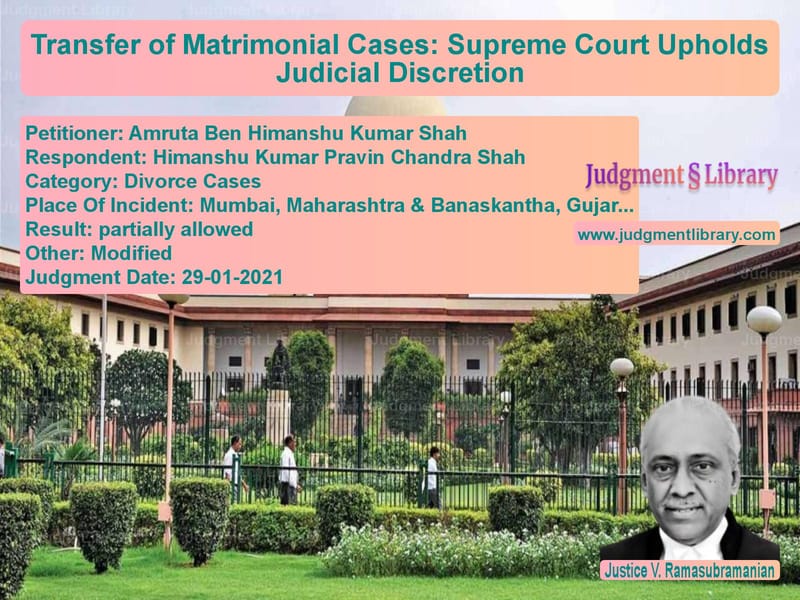Transfer of Matrimonial Cases: Supreme Court Upholds Judicial Discretion
The Supreme Court of India, in Amruta Ben Himanshu Kumar Shah vs. Himanshu Kumar Pravin Chandra Shah, dealt with a transfer petition filed by the wife, seeking to transfer Family Suit No. 33 of 2016 from the Family Court in Banaskantha, Palanpur, Gujarat, to a competent court in Mumbai, Maharashtra. The judgment examined the legal standards for transferring matrimonial cases and the importance of balancing convenience, fairness, and the stage of proceedings.
Background of the Case
The petitioner and the respondent were married on February 28, 2002, and had two children born on August 31, 2007, and January 27, 2011. Due to marital discord, the respondent (husband) initiated proceedings under Section 9 of the Hindu Marriage Act for restitution of conjugal rights in the Court of the Senior Civil Judge, Palanpur, Gujarat. The case was later transferred to the Family Court in Banaskantha and renumbered as Family Suit No. 33 of 2016.
The petitioner (wife) had earlier filed a transfer petition (T.P. (C) No. 615 of 2016), seeking the transfer of proceedings to Mumbai. However, that petition was dismissed on April 19, 2016, without issuing notice to the respondent. After three years, she filed a fresh transfer petition, citing a change in circumstances.
Grounds for Seeking Transfer
The petitioner sought a transfer of the case based on the following claims:
- Her mother had passed away on February 2, 2017, leaving her without emotional and financial support.
- She was the sole caretaker of two minor children and could not leave them in Mumbai to attend hearings in Palanpur.
- The Family Court in Palanpur dismissed her application requesting the respondent to cover her travel expenses.
- The Family Court listed the case multiple times every month, making it difficult for her to defend herself.
- Penalties were imposed whenever she sought an adjournment, and even the Legal Aid lawyer appointed for her was often absent.
Respondent’s Arguments
The respondent opposed the transfer petition, arguing:
- The proceedings for restitution of conjugal rights had reached the stage of judgment.
- Once a transfer petition had been dismissed earlier, a second petition on the same grounds was not maintainable.
- The wife had delayed cross-examination, which prolonged the trial.
Supreme Court’s Analysis and Findings
1. Change in Circumstances Justifies a Fresh Petition
The Court observed that the dismissal of an earlier transfer petition does not bar a fresh petition if there is a material change in circumstances. The Court stated:
“Dismissal of a petition for transfer may not operate as res judicata when a fresh petition is filed on change of circumstances.”
Since the petitioner’s mother had passed away and she was left with two minor children, the Court acknowledged that she faced significant hardship in attending hearings in Palanpur.
2. Advanced Stage of Proceedings Precludes Transfer
The Supreme Court noted that the case had already reached the final stage of judgment, with hearings on final arguments scheduled in September 2019. The Court remarked:
“When a case is at its final stage, this Court will be extremely reluctant to order the transfer, as it may derail the entire process.”
Thus, while recognizing the petitioner’s difficulties, the Court held that transferring the case at such a late stage would be inappropriate.
3. Relief to Mitigate Hardship
Instead of granting the transfer, the Court provided alternative reliefs to ensure fairness:
- The petitioner was allowed to file an application online or through her counsel to reopen her evidence.
- The Family Court was directed to take a lenient view and restore her right to present evidence.
- The respondent was ordered to bear travel expenses of ₹10,000 per visit for hearings requiring the petitioner’s presence.
- The Family Court was directed to allow the petitioner to attend hearings via video conferencing where feasible.
Supreme Court’s Verdict
- The prayer for transfer was rejected.
- The petitioner was permitted to reopen her evidence.
- The Family Court was instructed to accommodate her by allowing remote participation where possible.
- The respondent was ordered to cover the petitioner’s travel expenses when physical presence was necessary.
Conclusion
This ruling highlights key principles in matrimonial litigation:
- Transfer petitions can be reconsidered if circumstances change significantly.
- Courts avoid transferring cases at the final stage to prevent unnecessary delays.
- Judicial discretion is used to mitigate hardship without disrupting the trial.
- Virtual hearings and cost reimbursements can be alternatives to physical transfers.
By balancing the interests of both parties, the Supreme Court reinforced the importance of judicial efficiency while ensuring fairness in matrimonial disputes.
Petitioner Name: Amruta Ben Himanshu Kumar Shah.Respondent Name: Himanshu Kumar Pravin Chandra Shah.Judgment By: Justice V. Ramasubramanian.Place Of Incident: Mumbai, Maharashtra & Banaskantha, Gujarat.Judgment Date: 29-01-2021.
Don’t miss out on the full details! Download the complete judgment in PDF format below and gain valuable insights instantly!
Download Judgment: amruta-ben-himanshu-vs-himanshu-kumar-pravi-supreme-court-of-india-judgment-dated-29-01-2021.pdf
Directly Download Judgment: Directly download this Judgment
See all petitions in Alimony and Maintenance
See all petitions in Child Custody
See all petitions in Domestic Violence
See all petitions in Judgment by V. Ramasubramanian
See all petitions in partially allowed
See all petitions in Modified
See all petitions in supreme court of India judgments January 2021
See all petitions in 2021 judgments
See all posts in Divorce Cases Category
See all allowed petitions in Divorce Cases Category
See all Dismissed petitions in Divorce Cases Category
See all partially allowed petitions in Divorce Cases Category







